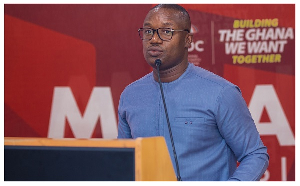The National Council for Curriculum and Assessment (NaCCA) has debunked assertions that the duration for Junior High School education has been extended to four years, whereas Senior High School education has been reduced to two years.
In an interview, the Executive Secretary of NaCCA Dr. Prince Armah explained that the new CCP Curriculum is the second phase of the Pre tertiary curriculum review started in 2017, with the KG and primary years programme currently being implemented by the Ghana Education Service.
As a sequel to the KG-Primary 6 curriculum introduced in September 2019, the common core curriculum is a carefully designed programme of nine subjects for learners in Basic 7 to Basic 10 (JHS 1 – SHS 1) as part of learning experiences to prepare them for post-secondary education, the world of work or both. “Some of the subjects that make up the Common Core Programme include Religious and Moral Education, Creative Arts and Design, Social Studies, Sciences, Computing, Career Technology, Physical and Health Education”, he added
Why CCP?
Espousing the distinctive features of the CCP, Dr Armah said the curriculum is designed around building character and nurturing values, in addition to ensuring a seamless progression for all learners from JHS to SHS and create clear pathways for academic and career related programmes from Basic 11 (SHS2) to Basic 12 (SHS3).
He further added that the CCP seeks to address the shortfalls in the current school system in relation to learning and assessment and promote better high school education that meets the varied learning needs of the young people in the country.
Learning and Assessment Proposals under the CCP
Touching on what the CCP assessment will focus on, Dr Armah said the new reform will assess knowledge, skills, attitudes and values with emphasis on what leaners can do, adding that in the 21st century it is no longer tenable for students to memorise facts and figures without being able to apply knowledge innovatively to solve everyday problems. Again the “learners will do personal projects, community project and/or community service as part of a comprehensive assessment programme designed under the National Pre Tertiary Assessment Framework.”
On how the students will be assessed, Dr Armah said an external assessment called the National Standards Assessment Test (NSAT) will be conducted in JHS 2 (Basic 8) to provide national level indicators to promote learners’ progression, as captured in the National Pre Tertiary Curriculum Framework published by NaCCA in 2018.
“Placement exams into SHS may still be conducted at the end of JHS 3 (Basic 9), adding, at the end of the CCP, the Common Core Examinations will be conducted, to guide learners in choosing a combination of courses either for academic or career-related pathways once they are already in the senior high schools.”
The Need for the Stakeholder Engagement
It was for this purpose that a stakeholder engagement has been planned to solicit the views and suggestions of key stakeholders towards the finalisation of the draft Common Core Programme (CCP) Curriculum. The meeting scheduled for Friday February 28 at the GNAT Hall in Accra is expected to be attended by reps from various teacher unions, student unions , educational directorate, School administrators, civil society organisations as well as the general public
Dr Armah was highly optimistic that the inputs and feedback from the event will contribute tremendously to produce a responsive Curriculum that will help “produce a new generation of Ghanaian high school graduates with the requisite 21st century skills, workplace ethos and employable skills”.
General News of Saturday, 22 February 2020
Source: starrfm.com.gh

















